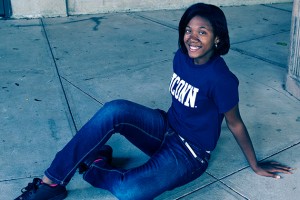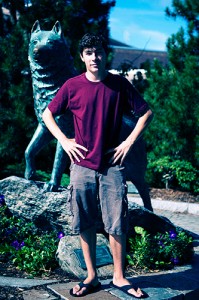Behind every aspiring UConn Husky is a story waiting to be told. This fall, UConn’s Class of 2017 arrived with the most impressive academic record of any incoming freshman class in the history of the University – and yet even grade point averages, SAT scores, and extracurricular activities can’t say it all. Here, in this collection of college admissions essay excerpts, we invite you to get a glimpse of the luminous personalities, personal experiences, and hard-won insights that define some of UConn’s newest students, as they tell you who they are, in their own words – with style, emotion, and candor.
Sunil K. Reddy
We always used to sit on the swing together. He would sing this frivolous line over and over again, “Men may come and men may go, but I’ll be there forever.” To me, it was just a fun song that was amusing.
 The sun illuminates a puddle glistening underneath the swing. I see the reflection of an auto-rickshaw, compelling me to ruminate about our trips.
The sun illuminates a puddle glistening underneath the swing. I see the reflection of an auto-rickshaw, compelling me to ruminate about our trips.
He took me to various places, such as the old-age home, the school for the blind, and the orphanage. But one day, the last stop was in front of a peculiar, frail mud house. Four small boys, wearing nothing but ragged underwear and dirt all over their bodies, ran up to us. This was their home. I couldn’t help but notice the desperation in their eyes. I was shattered. I was so bewildered as to why he would take me to such a place.
We went for a walk with the mother. He kept on encouraging her not to give up and to keep striving to provide for her family. We then took the children to the doctor’s office for a check-up. I was stunned by the fact that, despite the family’s being complete strangers, he still went out of his way to help them both physically and mentally.
I sat on the swing and sang that line repeatedly, “Men may come and men may go, but I’ll be there forever.”
All of his actions defined one word, success. This one word made me who I am today. Success is not about what you have in life; it’s about what you do for the lives of others in your lifetime.
How is it that he taught me everything, but nothing at all? He had not directly spoken to me about success, but he had shown me everything that I needed to achieve it. He taught me life’s greatest lesson, and no matter what, his lesson will always stay with me.
Holly A. Chase
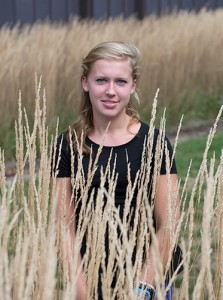 I love the mixed look of surprise and respect I receive when someone asks what instrument I play, and I respond, “I play percussion!” It’s not as if spotting a girl drummer is like finding a unicorn; we’re out there.
I love the mixed look of surprise and respect I receive when someone asks what instrument I play, and I respond, “I play percussion!” It’s not as if spotting a girl drummer is like finding a unicorn; we’re out there.
Among all boys for most of my band experience, I’ve always strived to be better than them: crisper with my rudiments, sharper with my rhythms, and more attentive during practice. However, my male peers always had an advantage over me, and that was confidence. I watched how they played the drums like they owned them, whether it was the correct rhythm or not. That wasn’t my style. I would play, but only if I could play the music right. Otherwise, I felt as if I was making a fool out of myself.
Regional auditions, jazz performances, and symphony band concerts all force me to play music that often mandates improvisation in front of an audience. I often wonder why I put myself through such high-pressure situations. Maybe it’s because I like to test myself, as playing percussion has forced me to try out new things that I may never have explored. Maybe it’s because I know there will never be a final examination on my confidence, only more opportunities to expand the genres I play and the techniques I employ. But maybe, it’s because, at the end of the day, all I want to do is beat the boys.
David H. Guirguis
We packed our last suitcase. It was the only thing we had left to remember: 30 inches of black fabric, enclosing the remains of our old life. We looked around our home, certain we would never return. My parents went to the old dining room table, the first piece of furniture they bought as a married couple back in Egypt. My mom ran her fingers down its jagged edge, once smooth, but now holding the indents of our childhood. I stood in complete shock. The place I had called home for 15 years would become nothing but a memory.
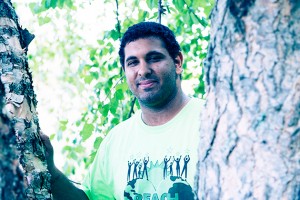 It was as I was starting my junior year that Hurricane Irene destroyed my home. A river that seemed a safe distance from us suddenly flooded 14 feet into my house, breaking the foundation and leaving my house condemned.
It was as I was starting my junior year that Hurricane Irene destroyed my home. A river that seemed a safe distance from us suddenly flooded 14 feet into my house, breaking the foundation and leaving my house condemned.
Reality hit when we moved our bags into a place we were now supposed to call “home.” It felt so empty. I began to unpack my bags, trying to make my room look familiar. I was so relieved when I smelled the aroma of my mom’s authentic macarona beshamel. The simple smell of her cooking made me feel a little more at home. At the dinner table, we relived the good times we had in our old house. Stories of holiday parties and embarrassing moments kept us up for hours. We recounted moving into our old home and how we had made it ours.
I realized what made a place home. It wasn’t the building. It wasn’t the address. It was the four of us. As we sat together reminiscing and laughing, I realized that home was my culture. Home was my mother’s authentic meals. Home was the four of us living together and laughing. I finally realized, I was home.
 Alleya R. Jenkins
Alleya R. Jenkins
I was your typical, naïve high school freshman. I saw an opportunity to get involved as I passed the crinkled basketball flyer hanging in the congested hallway. I was in need of that confidence the fall athletes had, strolling down the halls in their sports apparel. After surviving tryouts, I surprisingly saw my name on the final roster. Victorious, I was ready for jock glory.
The team welcomed me with disgusted looks at practice. I was one of only two freshmen, which resulted in my getting picked on. My skills were poor. I could not even make a simple layup. Every night for the first two weeks, I went home and cried.
I was used to being on top. I was a Straight A student. I was a top female black belt in my Tae Kwon Do school. Now I had hit bottom.
However, I decided to stay on the team. I had little playing time, but I worked harder than almost anyone else. Weeks later, Coach said he saw a 110 percent improvement from when I first walked on the court. Junior year, I was junior varsity captain, and this year, I will be co-captain on varsity.
Basketball was my first raw experience of not being initially good at something. Yes, it was hard to handle. To this day, I am not the best basketball player. But I have worked SO HARD to get where I am so that other shy freshmen girls will have a reason to lift their heads.
In college and perhaps the rest of my life, I will be expected to do things I have never been exposed to and probably will perform poorly. But that should not stop me from embracing the person I discovered and my team has come to know: a constant example of hard work that pays off.
Chaohua Wu
Last week I received a call from my uncle. After some chit-chat, he asked me about my college application. “Still struggling,” I replied. He hesitated for a second and then said, “You can hire a writer to write it for you. That’s what I did.” I never would have imagined my uncle using such a service. My uncle had always been a role model for me. He immigrated to the U.S. during his junior year of high school. He lacked all things English. Yet, despite this cultural handicap, he was accepted by an Ivy League school. My uncle’s acceptance convinced me that despite my own English deficiencies, I, too, could experience the success of college as well. But the fact that he cheated his way into the Ivy League challenged my own sense of wrong and right.
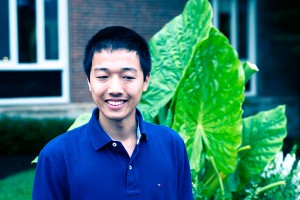 Admittedly, the temptation to follow his footsteps intrigued me. Writing had always been my Achilles’ heel. Words do not flow from my mind the way numbers do. My conscience told me that if someone else wrote my essay, that gave me an unfair advantage over my fellow applicants who worked hard on their essays. I knew hiring someone to write my essay was wrong not only academically, but morally as well. I had been raised to be independent, self-reliant, and honest. I had to appreciate the values my family had instilled in me, and relying on a hand other than my own was not honoring my values.
Admittedly, the temptation to follow his footsteps intrigued me. Writing had always been my Achilles’ heel. Words do not flow from my mind the way numbers do. My conscience told me that if someone else wrote my essay, that gave me an unfair advantage over my fellow applicants who worked hard on their essays. I knew hiring someone to write my essay was wrong not only academically, but morally as well. I had been raised to be independent, self-reliant, and honest. I had to appreciate the values my family had instilled in me, and relying on a hand other than my own was not honoring my values.
So here is my college essay – from my own hand and of my own heart. Whether I am accepted into college or not, I am perfectly at peace with the result because I did the right thing by listening to myself.
Selina E. Benitez
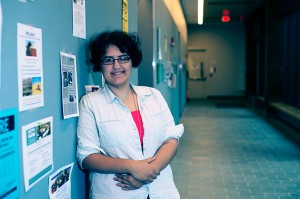 The small town in southern California that I was raised in brimmed with Mexican life, from the language and cuisine to traditions and values. Life in a Hispanic world was all that I knew. I danced and thrived in the hot, sweet, dry air of America-Mexicana.
The small town in southern California that I was raised in brimmed with Mexican life, from the language and cuisine to traditions and values. Life in a Hispanic world was all that I knew. I danced and thrived in the hot, sweet, dry air of America-Mexicana.
Flash forward a decade. Here I am in chilly, damp Griswold, Conn. You could fit all the Hispanic students of Griswold into one classroom. The closest thing resembling my old life is a shabby Taco Bell a few miles away, a place whose food is an American distortion of real Mexican cuisine.
I can’t change the county, state, or even little old Griswold in just a few years. However, I’ve come to warm my own little niche of life with the familiar embrace of Mexican culture. In Hispanic culture, family is the anchor and center of all life and action. Nothing is more important. We’re a people born of togetherness, of celebration, of leaving no minute of our lives wasted.
Connecticut is much more difficult to express my heritage in, but I do my best to make it work, starting in my own house. A house is just a building in which people can reside. Instead, I’ve chosen to live in a casa. I’ve made a home in which family is the biggest priority. I’m not a Mexican because of the words I speak or the foods I eat or even because of the color of my skin. I am a Mexican because I hold no distinction between friends and family; they are one and the same. I am a Mexican because I can’t restrain this burning in my heart, this need to connect with and take care of others when they need it most.
 Matthew P. Arnold
Matthew P. Arnold
I had braved doctor’s appointments, standardized tests, and daily drama without so much as a bat of an eye. I had always felt confident in my ability to perform. But today, uncertainty weighed on my conscience. Without a driver’s license, I would still be stuck in my childhood routine, chained to my parents and their schedule.
As I started the car and chatted with the instructor, my nerves lessened slightly. I headed to the Wal-Mart for the backing-in portion of the test. I had practiced this technique the most, and I was determined to get it right. Turning into the semi-busy parking lot and navigating through pedestrian traffic to an empty row, I could see that small plastic card just within reach.
Suddenly, dozens of seagulls descended around the car, blocking my path all around. My stomach lurched, and my heart dropped as I slammed on the brakes. This is it, I thought, I’m going to hit a bird and it’s going to be all over. It was then that I realized: Failure is not an option. I had gone through a lot more challenging experiences in life, and this was just one more obstacle to overcome. With a nod from the instructor and a couple of honks on the horn, the lot opened up and freedom once again came into view.
Arriving back at the testing center, the instructor handed me a copy of the assessment. Scanning the jumble of information and notes, one word caught my eye: PASSED. I realized that I had come away with more than just certification. The obstacles in life weren’t meant to be scary or insurmountable. They were there to teach me about true confidence, and to help me understand life’s uncertainties and my own path for the future.
Maman Cooper
In 2002, I was 6 years old, walking 3 miles daily to the farm along with my aunt and carrying her 2-year-old son. I worked in the fields harvesting cassava, corn, and hot peppers with the baby on my back. Every morning, I watched my aunt’s stepdaughter walk through the yard on her way to school. Leaning forward one morning while sweeping the yard, I watched her backpack bounce up and down, and I murmured, “I wish I can go to school, too.”
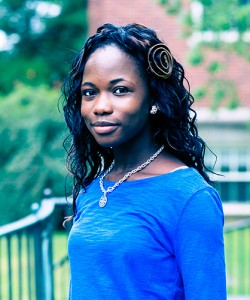 Migrating in 2004 from the refugee camp in Ivory Coast to the United States was one of the greatest challenges I ever encountered. Living in the Ivory Coast, like many children, I did not experience education. In Hartford, Conn., speaking only French and two other West African native languages made learning seem impossible. Three teachers each took turns pulling me out of class and teaching me basic English words. Although I fumbled on the words, I didn’t give up because the desire of learning was like a fresh fire inside of me still waiting to explore.
Migrating in 2004 from the refugee camp in Ivory Coast to the United States was one of the greatest challenges I ever encountered. Living in the Ivory Coast, like many children, I did not experience education. In Hartford, Conn., speaking only French and two other West African native languages made learning seem impossible. Three teachers each took turns pulling me out of class and teaching me basic English words. Although I fumbled on the words, I didn’t give up because the desire of learning was like a fresh fire inside of me still waiting to explore.
Finally attending school was a dream come true, but my peers found a great pleasure in teasing the dumb girl in the classroom with the accent. However, I remained encouraged knowing that I was now privileged to attend school. Attending the University of Connecticut will strengthen my knowledge and lead me to become a truly remarkable leader. My goal is to inspire many young girls around the world to stay hopeful while struggling under harsh conditions.
This article was first published in the Fall 2013 edition of UConn Magazine. To access more stories and audio clips like these, download UConn Magazine‘s free interactive app for tablet devices.

